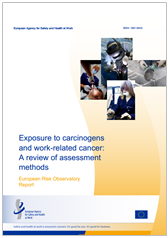// Documenti disponibili n: 46.227
// Documenti scaricati n: 35.933.507

Occupational cancer is a problem that needs to be tackled across the European Union (EU).
Estimates of the recent and future burden of occupational diseases indicate that occupational cancer is still a problem and will remain so in the future as a result of exposure of workers to carcinogens. The goals to which this review aims to contribute are to:
- describe occupational exposure to carcinogens and cancer-causing or -promoting working conditions at European, national and workplace levels;
- evaluate existing sources of information, identify major knowledge gaps and describe some new approaches needed to assess and prevent occupational cancer risks;
- describe occupational cancer prevention measures at European, national and workplace levels; and - make some recommendations for filling in gaps in relevant knowledge needed to prevent effectively future risks of occupational cancer.
The report looks into relevant occupational factors: chemical, physical and biological exposures, as well as other possibly carcinogenic working environment conditions (such as shift and night work).
It also examines opportunities to identify new causes or promoters of cancer. The issue of vulnerable groups of workers (for example women, young workers, workers experiencing high exposure to carcinogens, workers in precarious conditions) is addressed.
Less attention will be paid to topics that have been reviewed in detail elsewhere, such as the burden of disease, recognition of and compensation for occupational cancers (which are covered in statistical data collection by Eurostat through the European Occupational Disease Statistics), and the working capacity of cancer patients (although reference is made to some reports on return to work).
The target groups the report is aimed at are occupational safety and health (OSH) researchers and policy-makers, including social partners. It may also be useful to OSH prevention stakeholders for priority setting, and to those who deal with workplace risk assessment.
EU-OSHA 2014

ID 11469 | 02.09.2020 - Documento completo in allegato
Raccolta dei documenti ufficiali, indicazioni CTS e domande e risposte ministerial...

Decreto Direttoriale del 28 settembre 2011
Con Decreto Direttoriale del 28 settembre 2011 è stata istituita la Commis...

Definizione dei criteri per il rilascio delle autorizzazioni di cui all'articolo 82, comma 2), lettera c), del decreto legislativo 9 aprile 2008, n. 81 e successive modifiche ed...
Testata editoriale iscritta al n. 22/2024 del registro periodici della cancelleria del Tribunale di Perugia in data 19.11.2024